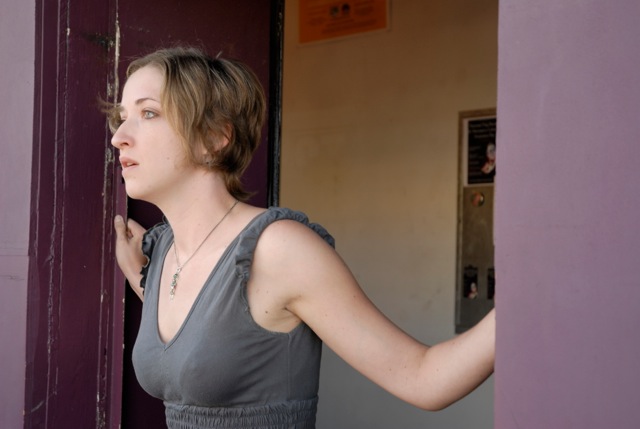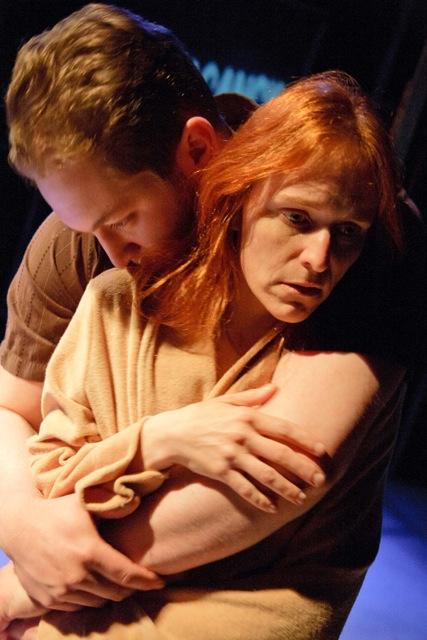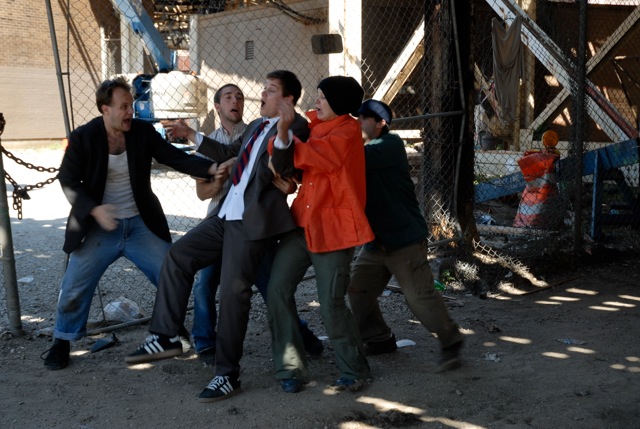|
JACQUELINE LAWTON: Why did you decide to get into theatre? Was there someone or a particular show that inspired you?
LARONIKA THOMAS: I was in college, at Indiana University, as a double major in Anthropology and Theatre. The plan had been to apply to graduate schools immediately after receiving my BA and to go on to get my PhD in Anthropology. But during my last semester I realized that if I made a list of all of the things I had done in college that I really enjoyed, it was heavily weighted with theatre. Also, I had heard of this crazy thing called dramaturgy, but I did not yet have any experience with it. I did know, in very basic and general terms, that it combined research with rehearsal responsibilities – and that definitely appealed to my nerdy personality. And then I was out in the “real world,” and had to figure out what to do next. I moved back to my hometown and started a theatre company, which led to my Masters in theatre and where I finally found my way to dramaturgy, which led to me moving to Chicago, interning at the Goodman and beginning my professional career as a dramaturg. I would not say there was one particular production that inspired me. I think it was more of an accumulation of experiences beginning from childhood, when I took dance lessons beginning at the age of 5, and then later when I played the villain (I got to die on stage – it was all very exciting to me) in a middle school classroom production of Billy Budd, through high school play productions where I had a very inspiring English and theatre teacher, and beyond. I do remember travelling to Chicago before I had graduated from IU and seeing a production at Steppenwolf – that was, I think, the first time I realized that theatre could actually be a viable profession. And I saw Too Much Light Makes the Baby Go Blind at the Neo-Futurists and remember thinking that *that* was the kind of theatre I wanted to make (and did make a few years later when I dramaturged several shows with them). JL: How do you define dramaturgy? Or explain to people the work that you do? LT: I am going to have to borrow from several other dramaturgs for my definition. Dramaturgs listen and question. We listen to and question the play, the playwright, the director, the artistic director, the actors, the designers, the mission of the theatre, the theatre, and the world – both as we know it and as we would like it to be. Robert Brustein called us the “humanist in the woodpile,” and I have always thought that had a nice ring to it. We research and contextualize the world of the play, work closely with playwrights and directors, serve as an audience before there is an audience. We are concerned with the work, with the place of the work within the larger world of the theatre, and the relationship between the audience and the work. JL: How long have you lived and worked as a dramaturg in DC? What brought you here? Why have you stayed? LT: Well, technically I live in Baltimore, though I have done quite a bit of work in DC since moving to the east coast from Chicago in 2009. My now-husband got a great job offer that brought us to Baltimore almost four years ago. I have to say it was a shock to my system. In Chicago I had a network of people I knew and worked with and loved. While I was lucky to know many people here in the DC-area thanks to my work with LMDA, the Baltimore and DC Theatre communities are in many ways very different from each other – and they are not, for many purposes, they same community. And they are different communities than Chicago. That may seem like an obvious thing to say, but it really reinforced to me the importance of “the local” in a theatre community. Moving did force me to reexamine the way I worked as I dramaturg and consider what was important to me. For the moment, this shift in focus has manifested itself in my return to school – I am currently getting my PhD in Theatre and Performance Studies and the University of Maryland. JL: If your work as a dramaturg doesn’t pay the bills, what else do you do? How do you balance this work with your dramaturgy? LT: Oh, if only it paid the bills! But I am optimistic and I look forward to the day when it does. In Chicago, I always had a “day job” of some sort. Occasionally it was in theatre or a related field – one of my most rewarding jobs was working with Communities in Schools of Chicago as a school/agency coordinator and the point person for coordinating arts partnerships. And sometimes my “day job” had nothing to do with theatre, such as selling insurance or my several month gig as a temp with a financial services company. It was definitely a juggling act and sometimes very tiring. But it also taught me to manage several projects at once and gave me many experiences I would not have otherwise had. As a freelancer, I was able to work on productions that were very different from one another, both in their process and in their product. As the Literary Manager for Stage Left Theatre, I was able to implement and oversee a process for script selection for the company, as well as dramaturg and direct several plays. And as a temp or “desk jockey,” in various companies, I got a good reminder that most people travel in worlds outside of mine – and people find fulfillment in a variety of ways. It was also fun to introduce those folks to my work as a dramaturg – teaching the world that word one office worker at a time. JL: What skills and traits do you feel a successful dramaturg should have to support the development of a new play or a production? LT: Dramaturgs should have the ability to listen. They need to know what questions to ask and when. They should have a good grasp of theatre and world history, and they should understand plays – both in terms of being able to analyze and break down a script and in terms of knowing the repertoire. They need to be good communicators and good collaborators. And when we are talking about new plays, dramaturgs need to be able to grasp very quickly what the playwright is going for in their script in order to be a sounding board for and a friend to the work. And I am probably leaving out several other handy skills, but the ones I have listed will at least get you started. JL: What is the greatest part of being a dramaturg? What has been your most difficult challenge? LT: I love the way being a dramaturg influences my view of the world. I get to become a temporary expert on one part of the world for a time. That thing I learned about dramaturgy way back in school – research and rehearsal – is true. I love the collaborative nature of the work – and that in the end we have something bigger than any one of us individually. The challenge is the day-to-day of balancing and juggling projects and making ends meet. I know that is just a boring answer but it is very important – you have to find ways to combat the anxiety and frustration that can come with that challenge, because the daily things you do can influence the bigger picture. JL: Who are your favorite playwrights? What is it about their work that inspires or draws you to them? LT: Is it too cheesy for me to say the next ones, the ones about to be discovered? I enjoy a wide variety of theatre but recently I have been thinking a lot about my time with the Neo-Futurists and I am interested in how the audience participates in the performance, their relationship with the work. So I am interested in very immersive events, even things closer to performance or installation art, happenings or Fluxus even, or the advent of digital technology in theatre and how that can change the relationship between audience and performance or audience and performer (theatre as video game and that sort of thing). Or shows like Suzan-Lori Parks’ Venus, when the audience is implicated in the events of the play during the show’s intermission whether they choose to stay in the auditorium or go to the lobby. There are also a few shows I have seen in the past couple of years that have really stuck with me – Mona Mansour’s The Hour of Feeling and Anne Washburn’s A Devil at Noon, both at recen Humanafests, and I was privileged to work on Greg Hischak’s quietly powerful meditation on America, Volcanic in Origin at Source Festival a couple of years ago. I have also been a fan of the work of Chuck Mee since I worked on Big Love at Purdue during my Masters program. And Clybourne Park is a current favorite – in part because it is the show I am working on now and in part because it addresses issues that I think major implications for all of us. JL: DC audiences are ... LT: Very informed, engaged, and up for new experiences. And, sometimes, they also happen to be national movers and shakers. JL: DC actors, designers and directors are .. LT: Wonderful and thoughtful – and I wish I knew more of them. JL: DC playwrights are … LT: Very dedicated to their work, and dedicated to both nurturing the local theatre ecology and engaging in national and international conversations about theatre – especially when it comes to new plays. AND they want to see those various ecologies interacting with each other for the betterment of all. JL: DC critics are ... LT: Also fantastic – especially when they are really engaged in the current issues affecting American theatre and theatre artists. And they are friends – they do their job because they love theatre. I wish contemporary media culture was not threatening to push them far into the sidelines of the field. JL: How do you feel the DC theatre community has addressed the issues of race and gender parity? How has this particular issue impacted you and your ability to get your work produced on the main stages? LT: What a great – and important – question! And I am thinking of both Baltimore and DC in my response. Baltimore’s theatre community is still so small (but growing fast!) in comparison to places like DC, but both communities are wrestling with these issues. I was just re-reading Suzan-Lori’s Park’s “Elements of Style” and she writes that it can be all too easy for those working in the theatre to feel frustrated with government officials and arts funding, when we need to focus on “our own bigotry, our own petty evils, own intolerance. . .which will be the death of the arts.” I think this is true. And we as artists think of ourselves the messengers of certain truths, but we also need to make sure we speak the truth to each other, and are not afraid to challenge each other to be better at what we do and how we do it. JL: What advice do you have for an up and coming DC based dramaturg who has just moved to D.C.? LT: DC is a fantastic place to make theatre. So is Baltimore – especially if you want to start a theatre company (for an example, check out the work and history of Single Carrot Theatre). And so this is the first part of my advice – wear the label of “Dramaturg” proudly, but also consider yourself a maker – a maker of theatre, of culture, of experiences, of life. Get to know one another. And, as the Vice President for Regional Activity for LMDA, I can help with this. LMDA is a great organization and provides a lot of support for dramaturgs at all stages of their careers – and local concerns are a big part of that! We want to know you! Make lots of work and make lots of different work to help you find your voice – what you are good at and what you enjoy. And respect yourself enough to make sure you are adequately compensated. Compensation may not always mean a paycheck at first – it may mean beer or a recommendation, but it should also mean your name in the program and web site and in other materials where you find the designers names, access to people at the companies you work with, substantive work tasks beyond making copies, the understanding that you are a part of the conversation of making the piece – and making the theatre company – what it is and should be, and always ALWAYS a seat at the table with everyone else. And – know when you can’t work without a paycheck any more too. Find mentors and cheerleaders. Remember this career is a choice that you made. Stay positive, find the work and the people you love, and don’t forget to have fun – you are one of the lucky few in life who get to dive into their passion. JL: What's next for you? Where can we keep up with your work? LT: Right now I am a full-time doctoral student at the University of Maryland, so I am not as active professionally as I would like to be right now. You can mostly find me reading and writing and teaching theatre. I am presenting at a conference on space and performance in April, and I am chairing a panel on the Dramaturgy of Space at ATHE in August. I hope to update my poor, neglected blog again beginning later this spring, so you’ll be able to find out about future projects there. And I am part of the dramaturgical team for CenterStage’s The Raisin Cycle – working on Clybourne Park has been very exciting and is a great match for me considering my research interests in urban space, cultural production, and the performance of identity. Finally, you can also follow me on Twitter, just like the rest of world.
1 Comment
D.M.Thomas
4/21/2013 02:12:04 pm
Wow! What a woman! You are so upbeat and positive. You must have had great role models.
Reply
Your comment will be posted after it is approved.
Leave a Reply. |
My BlogI'm a playwright, dramaturg, and teaching artist. It is here where you'll find my queries and musings on life, theater and the world. My posts advocate for diversity, inclusion, and equity in the American Theatre and updates on my own work. Please enjoy!
Categories
All
Archives
June 2020
Reading List
|



